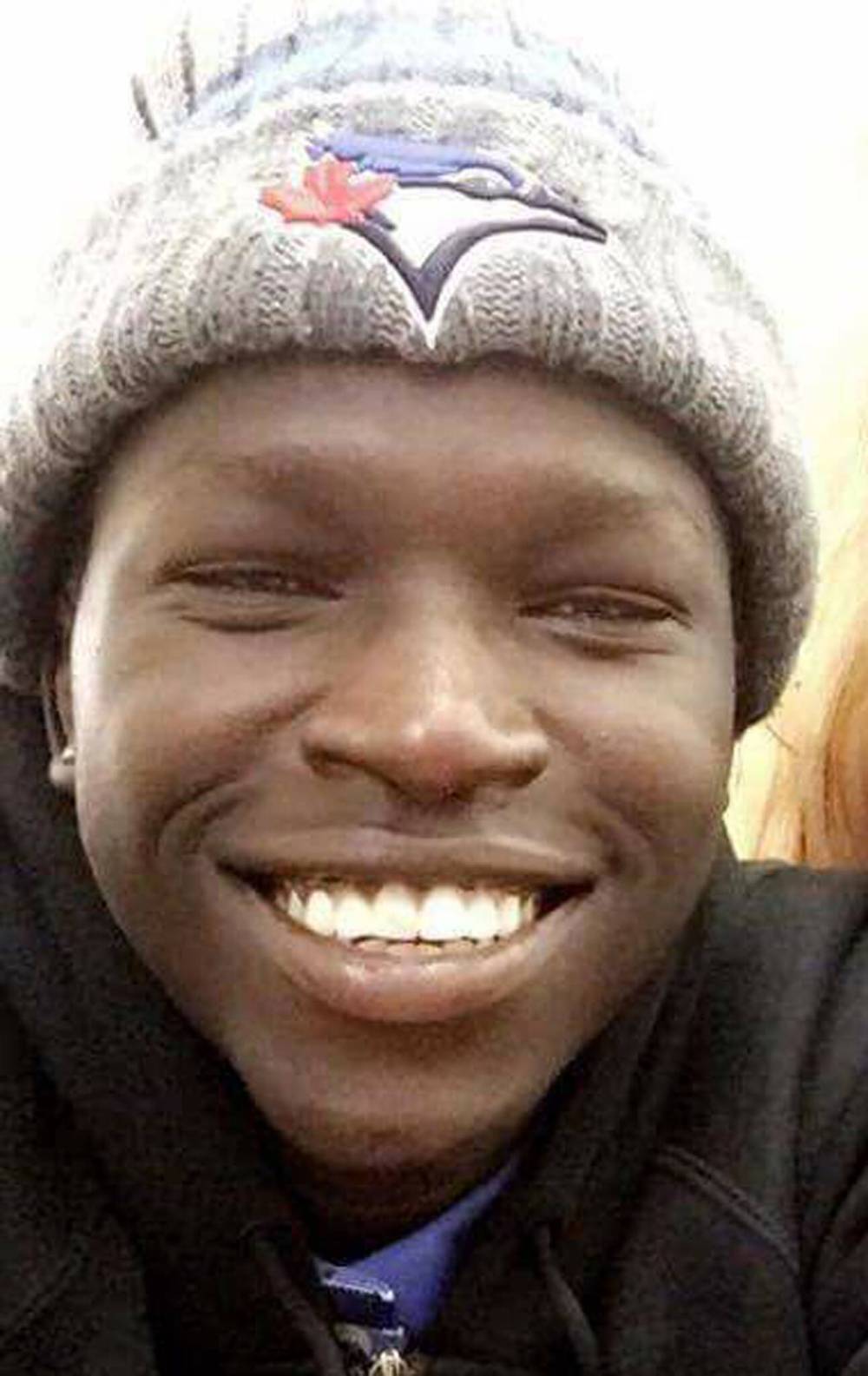‘What had our father done wrong?’ Court hears emotional statement from slain taxi driver’s grown children during sentencing hearing for 23-year-old mentally ill killer
Read this article for free:
or
Already have an account? Log in here »
To continue reading, please subscribe:
Monthly Digital Subscription
$0 for the first 4 weeks*
- Enjoy unlimited reading on winnipegfreepress.com
- Read the E-Edition, our digital replica newspaper
- Access News Break, our award-winning app
- Play interactive puzzles
*No charge for 4 weeks then price increases to the regular rate of $19.00 plus GST every four weeks. Offer available to new and qualified returning subscribers only. Cancel any time.
Monthly Digital Subscription
$4.75/week*
- Enjoy unlimited reading on winnipegfreepress.com
- Read the E-Edition, our digital replica newspaper
- Access News Break, our award-winning app
- Play interactive puzzles
*Billed as $19 plus GST every four weeks. Cancel any time.
To continue reading, please subscribe:
Add Free Press access to your Brandon Sun subscription for only an additional
$1 for the first 4 weeks*
*Your next subscription payment will increase by $1.00 and you will be charged $16.99 plus GST for four weeks. After four weeks, your payment will increase to $23.99 plus GST every four weeks.
Read unlimited articles for free today:
or
Already have an account? Log in here »
Hey there, time traveller!
This article was published 27/04/2023 (958 days ago), so information in it may no longer be current.
It was March 18, 2020, the early days of the COVID-19 pandemic, and Balvir Toor’s wife and children were joking that it was too dangerous to go to work, maybe he should stay home.
But he didn’t. “Pray for me,” the 44-year-old Duffy’s Taxi driver said as he left home to start another long shift behind the wheel.
Hours later Toor was dead, the victim of a shocking, unprovoked attack, with every grim detail captured on his taxi’s security video.
“We wish we could turn back time and stop our father from going to work,” Toor’s three university-age children wrote in a victim impact statement read out in court Thursday at a sentencing hearing for his killer, 23-year-old Okoth Obeing.
Toor’s wife and children have since moved to Edmonton, unable to remain in a city where somebody could be killed for just doing their job.
JESSE BOILY / WINNIPEG FREE PRESS FILES Taxis lined up in front of the Manitoba Legislative Building in a memorial to Balvir Singh Toor after he was murdered.
“What had our father done wrong?” Toor’s children wrote. “He was the nicest and kindest human being we knew, and he was brutally murdered for just trying to provide for his family.”
Obeing was convicted after trial of second-degree murder in what court heard was a rage-fuelled killing driven by Obeing’s hatred for people of South Asian descent and taxi drivers.
The minimum sentence for second-degree murder is life in prison with no chance of parole for 10 years. Prosecutors argued Thursday the racist element of the killing and other aggravating factors demand increasing Obeing’s period of parole ineligibility to 15 years.
“Mr. Obeing’s hatred… manifested in a violent manner with devastating consequences,” Crown attorney Monique Cam told King’s Bench Justice Joan McKelvey. “This court’s response to his behaviour must adequately reflect society’s rejection of his behaviour in order to give credence to this country’s values of multi-culturalism, diversity and inclusion.”
Obeing immigrated to Canada from Ethiopia when he was eight years old. He has been diagnosed with bipolar disorder and an intellectual disability, conditions which, his lawyers argued, reduced his moral culpability for his actions.
“Mr. Obeing’s mental disorder was central to the commission of the offence,” said defence lawyer Alex Steigerwald, who argued the period of parole ineligibility should be set at 10 years. “But for Mr. Obeing’s mental health, would we be here? In my respectful opinion, we would be not.”
Obeing may have been suffering the effects of bipolar disorder when he stabbed Toor 17 times, but it was rage and racism that drove the killing, not mental illness, Cam said.
Obeing’s mental illness “played a role, but ultimately it was his long-standing animus towards those of South Asian descent and taxi drivers… that led to his perceived disrespect by Mr. Toor.”
Defence lawyers argued unsuccessfully at trial that Obeing be found not criminally responsible for the killing. Such a finding requires that an accused, suffering from a mental disorder, did not know what they were doing was wrong or that they did not appreciate the nature and quality of their actions.
Toor was stabbed to death in his cab as he pulled over on the 500 block of Burrows Avenue. Video of the attack, which was recorded by the vehicle’s security camera, showed Obeing in the rear driver-side seat engaged in an angry verbal exchange with Toor.
MIKAELA MACKENZIE / WINNIPEG FREE PRESS FILES Balvir Toor was stabbed to death in his cab as he pulled over on the 500 block of Burrows Avenue.
“Shut the f—k up before I kill you,” Obeing told Toor before seemingly calming down and telling him to “just drive, bro.”
Seconds later, Obeing slid over to the rear passenger-side seat, reached around the driver shield and stabbed Toor 17 times in the arm and upper body. Then, he ran from the vehicle.
In a subsequent police interview, Obeing told investigators he had negative feelings towards South Asian people because of his experiences growing up and he disliked cab drivers, specifically those who demanded payment up front.
Obeing expressed frustration at not being accepted into a job program, and directed racial slurs at those he believed were “stealing jobs.”
“I’m not getting a job and it hurts,” he said. “I wasn’t taken seriously.”
Obeing admitted killing Toor, but when pressed by investigators would not say how, even when shown still images from the camera.
Obeing claimed he gave Toor $60 up front for the fare and became angry when he wouldn’t give him back $10.
“I had enough,” he said. “That was my last $60. It was money first, money first. I didn’t even f—-ing give him the address yet.”
A cab driver who provided Obeing a ride less than half an hour before Toor was killed testified his passenger became irate and abusive after he asked to be paid in advance. Parwez Paul said after a heated exchange, he gave Obeing his money back. Obeing got out of the cab before reaching his destination.
Dr. Jeffrey Waldman, a forensic psychiatrist called by the defence, testified at trial Obeing met the criteria for a not criminally responsible ruling, finding due to his bipolar disorder, Obeing “did not have conscious thought and control” of his actions at the time he stabbed Toor.
“Mr. Obeing’s mental disorder was central to the commission of the offence.”–Defence lawyer Alex Steigerwald
Court heard Obeing was experiencing manic episodes when he admitted himself to St. Boniface Hospital on Feb. 25, 2020. When he was released March 11, nine days before the killing, he had not been properly medicated, Waldman testified.
Obeing’s intellectual disability would have further compromised his ability to control his actions while suffering a manic episode, Waldman said.
McKelvey rejected Waldman’s testimony, agreeing with prosecutors who argued his forensic assessments made conclusions not supported by the evidence of other trial witnesses and that Waldman did not question Obeing about the killing or his state of mind at the time.
McKelvey will sentence Obeing on May 12.
dean.pritchard@freepress.mb.ca

Dean Pritchard is courts reporter for the Free Press. He has covered the justice system since 1999, working for the Brandon Sun and Winnipeg Sun before joining the Free Press in 2019. Read more about Dean.
Every piece of reporting Dean produces is reviewed by an editing team before it is posted online or published in print — part of the Free Press‘s tradition, since 1872, of producing reliable independent journalism. Read more about Free Press’s history and mandate, and learn how our newsroom operates.
Our newsroom depends on a growing audience of readers to power our journalism. If you are not a paid reader, please consider becoming a subscriber.
Our newsroom depends on its audience of readers to power our journalism. Thank you for your support.















